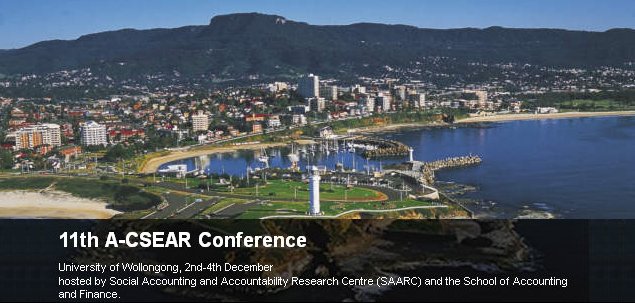Location
Bld 67.201
Start Date
3-12-2012 2:30 PM
End Date
3-12-2012 3:00 PM
Description
Purpose: To examine and interpret the activity, arguments, and policy proposals put forward over a four-year period by a major state-owned fossil-fuel company, on climate-change policy and emissions trading in New Zealand. Design/methodology/approach: The signing of the Kyoto protocol by the New Zealand Government in 1997, followed by the introduction of Climate Change Response legislation in 2002, and the proposed introduction, and subsequent implementation, of a New Zealand emissions trading scheme between 2007-2011, provide the empirical context for our research. In order to investigate the position on GHG management of a key member of the fossil-fuel industry, submissions on each of the four stages of pre-consultation and review process on the emissions trading scheme were analysed, with a focus on key arguments, policy proposals, and degree of involvement in policy formulation. The company responses were evaluated from a legitimacy theory perspective. Findings: A notable position on emissions control, in which it was argued that New Zealand should be allowed to increase gross emissions over time, whilst relying on carbon sinks, primarily forestry, in order to meet net emissions targets, was revealed. The rationale was that since most New Zealand production processes are less emissions intensive than those elsewhere, New Zealand should enjoy a privileged position in the production of certain commodities relative to other countries. Economic growth, emissions leakage and energy efficiency arguments were invoked to support the position that net emissions reductions should only be made if required by international treaty obligations, and then only in line with actions of key trading partners. It was argued that if an emissions trading scheme were to proceed it should provide maximum support for emitters, free allocations, subsidised allocations, delayed entry of sectors into the scheme and an extended phase-out period for free allocations. The company was found to have played a major role in the submissions process.
Our place is special: the response of a major fossil-fuel company to emissions trading developments in New Zealand
Bld 67.201
Purpose: To examine and interpret the activity, arguments, and policy proposals put forward over a four-year period by a major state-owned fossil-fuel company, on climate-change policy and emissions trading in New Zealand. Design/methodology/approach: The signing of the Kyoto protocol by the New Zealand Government in 1997, followed by the introduction of Climate Change Response legislation in 2002, and the proposed introduction, and subsequent implementation, of a New Zealand emissions trading scheme between 2007-2011, provide the empirical context for our research. In order to investigate the position on GHG management of a key member of the fossil-fuel industry, submissions on each of the four stages of pre-consultation and review process on the emissions trading scheme were analysed, with a focus on key arguments, policy proposals, and degree of involvement in policy formulation. The company responses were evaluated from a legitimacy theory perspective. Findings: A notable position on emissions control, in which it was argued that New Zealand should be allowed to increase gross emissions over time, whilst relying on carbon sinks, primarily forestry, in order to meet net emissions targets, was revealed. The rationale was that since most New Zealand production processes are less emissions intensive than those elsewhere, New Zealand should enjoy a privileged position in the production of certain commodities relative to other countries. Economic growth, emissions leakage and energy efficiency arguments were invoked to support the position that net emissions reductions should only be made if required by international treaty obligations, and then only in line with actions of key trading partners. It was argued that if an emissions trading scheme were to proceed it should provide maximum support for emitters, free allocations, subsidised allocations, delayed entry of sectors into the scheme and an extended phase-out period for free allocations. The company was found to have played a major role in the submissions process.


